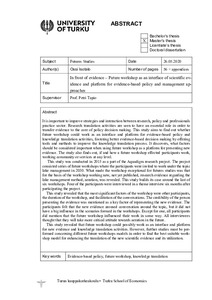In front of evidence : Future workshop as an interface of scientific evidence and platform for evidence-based policy and management approaches
Isotalo, Ossi (2020-06-04)
In front of evidence : Future workshop as an interface of scientific evidence and platform for evidence-based policy and management approaches
Isotalo, Ossi
(04.06.2020)
Julkaisu on tekijänoikeussäännösten alainen. Teosta voi lukea ja tulostaa henkilökohtaista käyttöä varten. Käyttö kaupallisiin tarkoituksiin on kielletty.
avoin
Julkaisun pysyvä osoite on:
https://urn.fi/URN:NBN:fi-fe2020062646019
https://urn.fi/URN:NBN:fi-fe2020062646019
Tiivistelmä
It is important to improve strategies and interaction between research, policy and professionals practice sector. Research translation activities are seen to have an essential role in order to transfer evidence to the core of policy decision making. This study aims to find out whether future workshop could work as an interface and platform for evidence-based policy and knowledge translation activities, fostering better evidence-based decision making by offering tools and methods to improve the knowledge translation process. It discovers, what factors should be considered important when using future workshop as a platform for presenting new evidence. The study also finds out, if and how a future workshop effected participants work, working community or services at any level. This study was conducted in 2015 as a part of the Aquadigm research project. The project consisted series of future workshops where the participants were invited to work under the topic lake management in 2030. What made the workshop exceptional for futures studies was that for the basis of the workshop working new, not yet published, research evidence regarding the lake management method, aeration, was revealed. This study builds its case around the last of six workshops. Four of the participants were interviewed in a theme interview six months after participating the project. This study revealed that the most significant factors of the workshop were other participants, the duration of the workshop, and facilitation of the conversations. The credibility of the person presenting the evidence was mentioned as a key factor of representing the new evidence. The participants felt that the new evidence aroused conversation around the topic, but it did not have a big influence in the scenarios formed in the workshops. Except for one, all participants did mention that the future workshop influenced their work in some way. All interviewees thought that they will take more critical attitude towards aeration in the future. This study revealed that future workshop could possibly work as an interface and platform for new evidence and knowledge translation activities. However, further studies must be performed concerning different future workshops models in order to find the best suitable workshop model for enhancing the translation of the new scientific evidence and its utilization. Jotta päätöksenteko perustuu aina parhaaseen saatavilla olevaan tietoon, vuoropuhelua tutkimustulosten, päättäjien ja yksityisen sektorin välillä tulisi kehittää. Tutkimustietoa pystytään nostamaan päätöksenteon keskiöön välittämällä tutkimustietoa tehokkaasti sidosryhmiä hyödyntäen. Tämä tutkimus pyrkii selvittämään, voiko tulevaisuusverstas toimia tutkimustietoon pohjautuvan päätöksenteon ja tiedonvälittämistoimien kanavana ja alustana vahvistaen parempaa todisteperusteista päätöksentekoa tarjoamalla työkaluja ja metodeja parempien tiedonvälittämistoimien saavuttamiseksi. Lisäksi selvitettiin, mitkä tekijät osoittautuvat tärkeiksi, kun tulevaisuusverstasta käytetään tutkimustiedon esittelyssä sekä oliko tulevaisuusverstaalla siirtovaikutusta osallistujien työhön, työyhteisöön tai heidän tarjoamiinsa palveluihin. Tutkimus perustuu vuonna 2015 järjestettyihin tulevaisuusverstaisiin, jotka järjestettiin osana Aquadigm-tutkimusprojektia. Tulevaisuudentutkimuksen näkökulmasta verstaat olivat poikkeuksellisia, sillä verstaissa esitettiin uusia, julkaisemattomia tutkimustuloksia. Tulokset toteavat järvienkunnostuksessa yleisesti käytetyn menetelmän, hapetuksen, olevan tehoton ja jopa haitallinen hoitomuoto. Aqadigm-projektin puitteissa järjestettiin kuusi tulevaisuusverstasta ja tämä tutkimus keskittyy niistä viimeiseen, yksityisellä sektorilla työskenteleville asiantuntijoille tarkoitettuun, tulevaisuusverstaaseen. Aineisto kerättiin teemahaastattelulla neljältä verstaaseen osallistuneelta asiantuntijalta. Tutkimuksen mukaan tärkeimpiä tekijöitä tulevaisuusverstaan onnistumisen kannalta ovat verstaan osallistujat, verstaan kesto sekä verstaan fasilitaattoreiden toiminta. Uuden tutkimustiedon kannalta oleelliseksi todettiin tiedon esittelijän uskottavuus. Osallistujat kokivat uuden tutkimustiedon virittäneen keskustelua, mutta sillä ei ollut suurta merkitystä verstaassa muodostettujen tulevaisuusskenaarioiden kannalta. Yhtä lukuun ottamatta kaikki osallistujat olivat hyödyntäneet verstaassa saatuja ajatuksia tai uusia tietoja omassa työssään jollain tavalla. Kaikki vastaajat kertoivat suhtautuvansa hapetukseen tulevaisuudessa aiempaa kriittisemmin. Tutkimuksessa saatiin viitteitä siitä, että tulevaisuusverstas saattaisi olla toimiva alusta uuden tutkimustiedon esittelyssä sekä välitettäessä tutkimustietoa päätöksenteon keskiöön. Lisää tutkimustietoa kuitenkin tarvitaan, jotta saadaan selville, minkälaiset tulevaisuusverstaat edistävät parhaiten uuden tutkimustiedon välittymistä päätöksentekoon ja käytäntöön.
